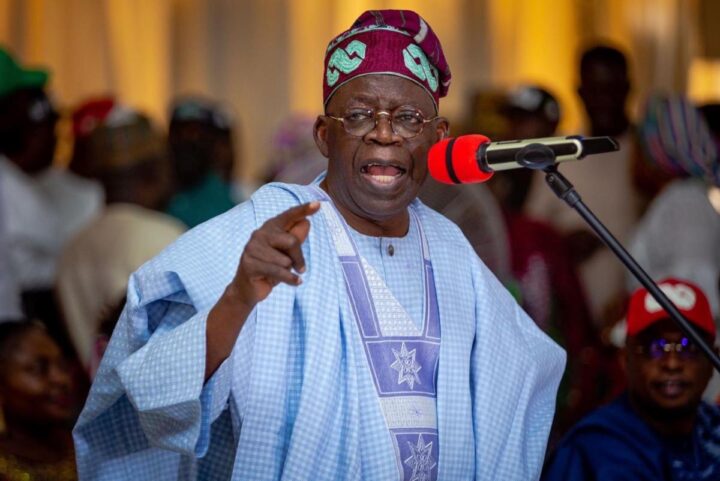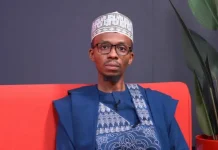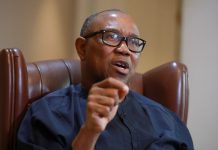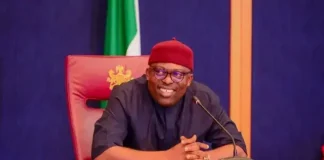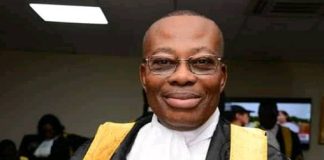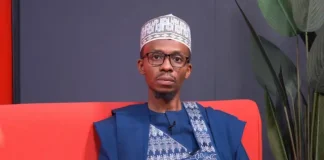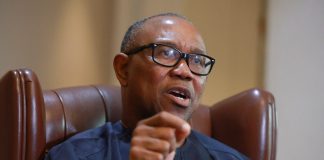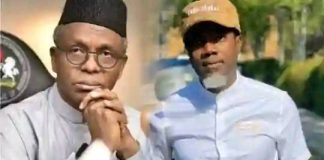🌿 Ruzu Non-Alcoholic Herbal Bitters
Ruzu Non-Alcoholic Herbal Bitters is a natural health supplement specially formulated to:
- ✅ Promote general wellness
- ✅ Detoxify the body
- ✅ Support the treatment of various ailments
Made from a powerful blend of 100% organic and medicinal herbs, Ruzu is completely alcohol-free, making it ideal for:
- 👪 All age groups
- 🌱 Health-conscious individuals
- 🌿 Anyone seeking non-alcoholic herbal remedies
Whether you're looking to boost your vitality, cleanse your system, or support healing the natural way, Ruzu Bitters offers a trusted herbal solution.
Nigerian editors have been tasked by President Bola Tinubu with upholding national unity, justice, and truth in their reporting.
In order to maintain democracy and foster national unity, the Nigerian leader emphasized the importance of the media.
Speaking at the opening of the Nigerian Guild of Editors’ (NGE) Annual Conference on Wednesday, November 12, 2025, at the State House in Abuja, the President reportedly commended the Nigerian press for its longstanding role in upholding democracy and urged editors to carry on that legacy through responsible journalism.
According to Tinubu, journalism is more than just a career; it is “an instrument of national awakening” that has influenced Nigeria’s democratic transition.
Declaring that their sacrifices “form part of the foundation upon which our democracy rests today,” he praised former journalists who put their lives in danger during colonial rule and military dictatorship.
“Freedom won via struggle is not sustainable on its own.” It necessitates ongoing attention to detail and responsible exercise,” the President said.
He emphasized to editors that “the integrity of public conversation” is just as important to democracy as legislation and elections.
“You create narratives as managers and editors of the country’s information environment. The public’s perception is influenced by you. You determine what becomes a national priority and how our shared struggles are seen,” he stated.
Recognizing that Nigeria’s diversity always leads to differences, Tinubu asked editors to make sure public discourse continues to be positive and nationalistic.
“When constructive and well-informed, criticism benefits the country.” However, cynicism that fosters distrust and hopelessness can undermine the fundamental underpinnings of the society we all work to advance,” he said.
Even in the face of ideological and political differences, Tinubu emphasized that the national interest must always come first.
Concerned about the increasing dissemination of misleading information on social media, the President cautioned that “falsehood can take root before truth has time to speak.”
In a time when “every citizen is now a potential publisher,” he asked editors to act as the gatekeepers of truth.
“Balance must be your principle, professional judgment must be your guide, and verification must be your anchor,” he stated.
Tinubu urged the media to “report boldly, but truthfully” and to criticize government policies “with knowledge and fairness,” emphasizing that journalism should promote rather than undermine.
Reaffirming his dedication to growth and reforms, Tinubu
Regarding governance, Tinubu reaffirmed his administration’s dedication to enhancing the welfare of its population and stabilizing the economy.
“The reforms we have implemented have been difficult, but they are intended to put our economy on a solid and long-lasting footing,” he stated.
“We have taken action to boost investment, reestablish confidence, and restore macroeconomic equilibrium. Numerous economic sectors exhibit indications of development.
He did, however, concede that there is still more work to be done and promised that his government will make sure that economic expansion results in actual improvements in Nigerians’ quality of life.
According to the President, nation-building necessitates collaboration from all sectors, including the media, private organizations, and civil society, and goes beyond government initiatives.
“There is a role for government. There is a role for the private sector. Civil society serves a purpose. He added, “The media has a clear obligation to contribute to the development of a climate of reason and unity.”
“Let us choose clarity over confusion, responsibility over recklessness, and hope over despair,” he added, urging editors to respect the ethics of their profession and concentrate on productive discourse.
Here is the complete speech of President Bola Tinubu.
“OPENING ADDRESS AT THE NIGERIAN GUILD OF EDITORS’ ANNUAL CONFERENCE STATE HOUSE WEDNESDAY, NOVEMBER 12, 2025, BY HIS EXCELLENCY, PRESIDENT BOLA AHMED TINUBU GCFR”
PROTECTION
I have the honor of welcoming you to the State House for the Nigerian Guild of Editors Annual Conference this year. Your participation here demonstrates the media’s ongoing significance in determining the course of the country and bolstering democracy. I applaud the Guild’s leadership for continuing this legacy of introspection and professional involvement.
The theme you have selected, “Democratic Governance and National Cohesion: The Role of Editors,” challenges us to consider how our democracy is doing and how public debate can either enhance or weaken the ties that bind our country together. As we continue to create institutions that are open, strong, and trusted by our people, this discussion is essential.
In Nigeria, journalism has been more than just a profession throughout our history. It has served as a catalyst for a national awakening. The Nigerian press has stood up for reason, decency, and advancement at pivotal moments in our country’s history, from the early publications that opposed colonial injustice to the moral voices that maintained hope during the dark days of military dictatorship. In order to protect the public interest, many journalists had to deal with harassment, imprisonment, and personal suffering. Our democracy today is built in part on the sacrifices they made. We pay tribute to them in remembrance as well as by continuing to uphold the principles they stood for.
However, freedom won via hardship cannot last on its own. It calls for careful exercise and ongoing attention to detail. Elections, legislation, and the integrity of public discourse all contribute to the maintenance of a democracy. This is where you play a crucial and essential role.
You create stories as managers and editors of the country’s information space. The public’s perception is influenced by you. You determine the national focus and the interpretation of our shared concerns. The weight of such obligation is substantial. It must be used with discernment, justice, and a keen sense of patriotism.
The nation of Nigeria is vast and varied. We live in a world where disagreements and debate are common. Disagreement, however, should never result in the weakening of national unity. When constructive and well-informed, criticism is beneficial to the country. However, cynicism that fosters distrust and hopelessness has the potential to undermine the fundamental tenets of the society that we all work to make better. It is imperative that the national interest always come first.
Information spreads quickly and widely in the modern world. Thanks to social media, anyone may now become a publisher. Although this has advantages, it also speeds up and spreads false information. It is possible for lies to spread before the truth has a chance to speak. The editorial role is more crucial than ever in this setting. Your anchor must be verification, your principle must be balance, and your guide must be professional judgment.
Therefore, I implore you to keep upholding the greatest journalistic standards. Be bold in your reporting, but be honest. Be fair and knowledgeable while criticizing government policies. Your goal should always be to create a better society rather than to destroy it.
As for us, our administration is still dedicated to protecting the country, maintaining economic stability, and expanding opportunities for all residents. Although the reforms we have implemented have been difficult, they are intended to establish a solid and long-lasting foundation for our economy. We have taken action to boost investment, reestablish confidence, and restore macroeconomic equilibrium. Progress can be seen in a number of economic sectors. However, we are aware that there is still more work to be done, and we are committed to making sure that progress results in actual enhancements to Nigerians’ everyday lives.
But institutional advancements and economic reforms by themselves won’t create the Nigeria we want. Collaboration is necessary to establish a nation. It necessitates trust. We must acknowledge that our future is interconnected. The government has a job to do. There is a role for the private sector. Civil society serves a purpose. Additionally, it is the media’s specific duty to foster an atmosphere of harmony and reason.
I beg that you continue to carry out your duty with integrity and seriousness. Let’s choose accountability over carelessness, clarity over ambiguity, and hope over hopelessness. Let us keep in mind that the narratives we tell ourselves as a people and a nation shape the nation we become.
Distinguished Editors, your efforts are important. The standards you uphold, the tone you set in your newsrooms, and the bravery with which you stand up for the truth will all influence how our country develops. Let’s fulfill this obligation purposefully.
I hope you have meaningful, productive, and constructive talks, and I eagerly await the results of your conversations.
Thank you, and may the Federal Republic of Nigeria be blessed by God.
Ahmed Bola Tinubu, GCFR
President, Head of the Military,
Republic of Federal Nigeria.

